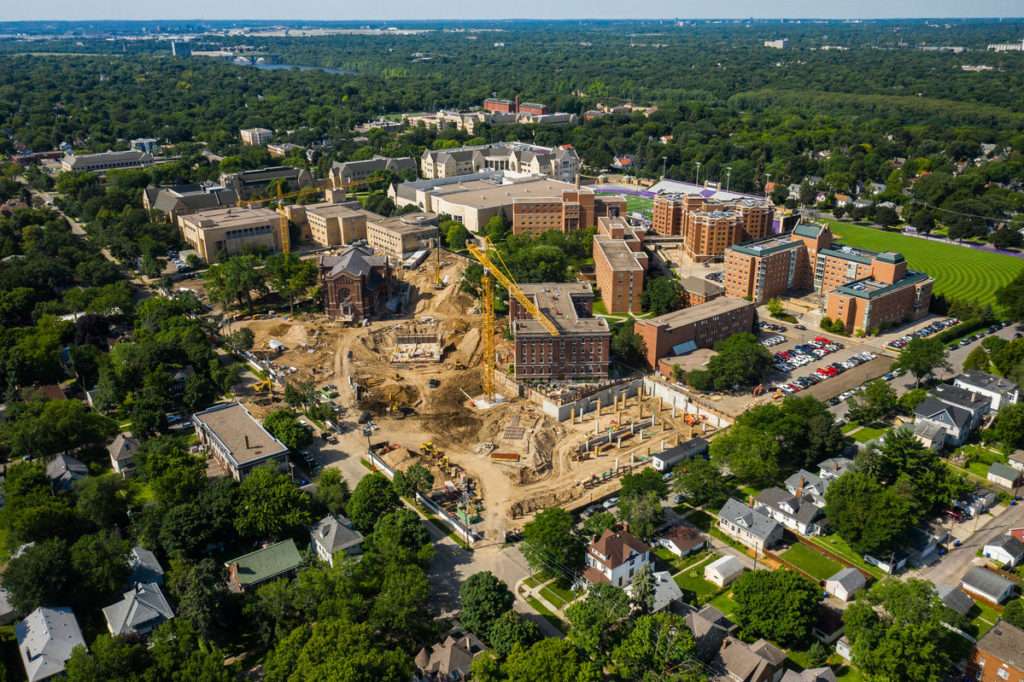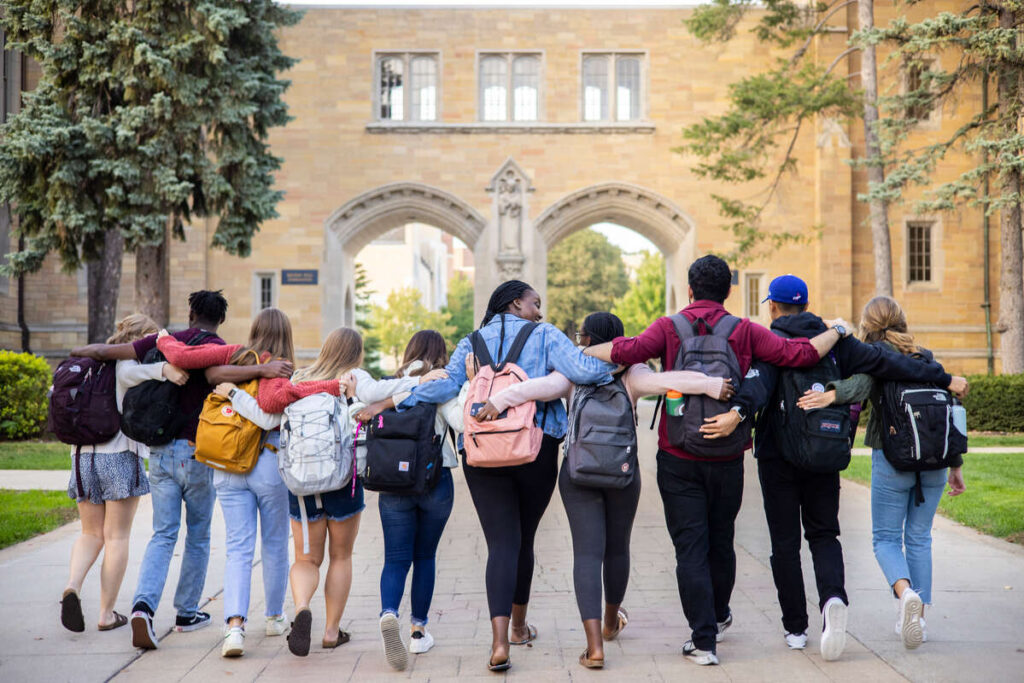Nationally, there is a mental health crisis and the St. Thomas community is not immune. Mental health issues are growing fastest among young people; one in five young adults in the United States lives with a mental illness, so more students are entering college with pre-existing health issues.
According to Mental Health America’s 2018 report, nearly 12 percent of youth (age 12-17) report suffering from at least one major depressive episode in the past year and 63 percent of youth with major depression do not receive any mental health treatment.
Many students are coming to college who probably would not have a generation ago, said Steven Maurer, PhD, director of Counseling and Psychological Services at the University of St. Thomas. “Grade school and high school students are being diagnosed and treated earlier, and schools are providing education plans that support students’ progress. Colleges, in turn, are providing services to better support students with mental health concerns, so more students see college as a realistic opportunity to pursue."
The top two mental health issues nationally and at St. Thomas are anxiety and depression. At St. Thomas Health Services, Madonna McDermott, executive director for health, wellness and counseling, has seen a 400 percent increase in mental health-related appointments over the last two years.
The rise in demand can be attributed to a combination of influences, which include increased prevalence of mental illness in adolescents and young adults, high levels of stress (especially financial and academic stress) and increased matriculation of students with mental illness, according to a Student Affairs proposal to expand services.
“For our students to succeed academically and live happy, productive lives, it is imperative that we proactively care for their health and well-being,” McDermott said. That is the motivation that guided the health, counseling and wellness staff to develop a concept for a Center for Well-Being [expected to open this fall] and the Undergraduate Student Government (USG) to allocate funds to hire more counseling help.
The health and well-being of college students play a critical role in retention, academic progression and graduation.
“St. Thomas’ goal is to create an environment where all students are able to achieve their full potential by providing them with the resources, support and education to achieve lifelong health and well-being,” said Karen Lange, EdD, St. Thomas vice president for student affairs.
College and mental health
Young adults face a multitude of challenges in college. Along with academic expectations, which bring their own amount of stress, students need to navigate a new environment that can seem overwhelming, especially for those who already have mental health concerns.
In a 2017 survey of directors by the Association for University and College Counseling Center Directors, anxiety was found to be the biggest mental health concern among students (48.2 percent) followed by stress (39.1 percent) and depression (34.5 percent). Students who experience mental health problems are also at a higher risk of dropping out of school.
A report last year about mental health on college campuses by the National Council on Disability revealed more students are seeking support for mental health disabilities, including mental illness that adversely affects educational performance.
Maurer gave an example: “I consulted with a faculty member who was working with a student – a really good student – who was struggling and whose performance was dipping. The student came in during office hours to talk about the academic performance and ended up talking about significant family problems. Dad was abusing alcohol heavily; finances were really, really a pressure for the student; the student didn’t know if they would be able to stay at St. Thomas. The student also talked about being depressed and having thoughts of suicide. … The faculty member did a really good job of supporting that student in the moment and making a referral to our office.
“Some of the increase in the requests and demand for services at St. Thomas is because we’re doing a better job helping students become aware of services and access those resources,” Maurer said. “We’re doing a better job of training members of our community at St. Thomas to better recognize when a student is struggling with a mental health issue and get them to appropriate resources. We also see that as we work to decrease [discrimination about] mental health concerns, more students are going to be coming in.”
However, there is often a wait time to see a counselor. Last year, students from the Schulze School of Entrepreneurship researched how to address the mental health needs of students and learned about wait times. They interviewed staff in charge of mental health resources, and many students. The entrepreneurship students recommended splitting the waitlist for acute and non-acute cases.
Last May, other students also expressed concern with the wait times to see a counselor, so the USG took action and voted to approve almost $100,000 in funding for additional counselor support for the current academic year.
“Campus resources and support for all students relating to mental health was at the forefront for the USG during the time I was president,” Ryan Foster ’18 said. “Knowing that the inadequate number of counselors was only a piece of the pie for increasing St. Thomas’ footprint of mental health resources, we had the opportunity to add three new part-time counselors and bump a current part-time counselor up to a full-time employee. I am a firm believer in every individual addressing their own mental health, no matter the level of severity; it is nothing to be ashamed of. Together, we can break the [discrimination] and create more dialogue around this very important topic.”
“There is a good body of research on academic performance and retention that has been conducted at various schools around the country,” Maurer said. “At St. Thomas, we know that in the past five years, around 80 percent of our clients report that counseling improved their ability to continue as a student.”

Getting care on campus
Sometimes, one of the biggest challenges for students is walking through the door to get help.
“When you enter a facility and you know that facility is just for mental health, for some people that can create a barrier,” McDermott said.
“What seems like a small barrier to the rest of us,” Maurer said, “for a student who is really anxious and avoidant, or a student who is really depressed and has very little energy or motivation, it may have taken all of their energy and motivation to come to that initial appointment.”
The university currently offers counseling and psychological services, located in Murray- Herrick Campus Center, and health services, located in the lower level of Brady Hall. However, the separate locations make it difficult for students to get from one appointment to the other, and too often coordinated care falls through the cracks.
“Right now, a nurse practitioner may say [to a student], ‘You need to go over to the counseling center,’ and they may not take the time to walk over there or know where it is,” Lange said. “If we had services co-located, we’d be able to say, ‘Right next door is a psychologist. Let me introduce you.’”
“Having services located in the same facility with coordinated care has better outcomes for students,” McDermott said.
Center for Well-Being to offer coordinated care
Proactively caring for health and well-being is vital for students to succeed academically. Many experts recommend a holistic approach to treating mental health that includes health services, counseling and wellness services. This enhanced and coordinated integrated health care model treats the whole person, not just a single symptom that might be affecting them.
The Center for Well-Being will open this fall. It will integrate counseling, primary health services, wellness and violence prevention into one location. Students who seek help will be able to access both physical and mental health services in an integrated care setting, in a timely manner. The center will promote the health of mind, spirit and body to help St. Thomas students become resilient learners and engaged members of the university community.
“We are responding in a way that will put the health and wellness of our students front and center while making St. Thomas an innovator in student well-being,” said St. Thomas President Julie Sullivan.
While mental illness and unmanaged stress are barriers to academic success, mental health also affects physical health. If you don’t feel well – mentally or physically – it’s hard to focus on academics. Research also has shown links between serious mental illnesses and reduced life expectancy, heart disease and cancer.
The American College Health Association has created the Healthy Campus 2020 initiative, a college inspired take on the Office of Disease Prevention and Health Promotion’s Healthy People 2020 program, which emphasizes an ecological approach to disease prevention and health promotion. It identifies a variety of leading health indicators including access to health services, mental health, healthy nutrition, physical activity, violence prevention, lowering alcohol consumption and robust resiliency programming.
An innovative and proactive approach
According to the 2015 Healthy Minds Study, 53 percent of students nationally met the criteria for flourishing, which was defined as positive mental health. Still, one in two students is not flourishing. It is important to expand existing programs and create new programs and incentives for students to practice self-care through wellness, resiliency and healthy living, taking some of the pressure off the demand for clinical services. At St. Thomas, this would include building a robust resiliency program as well as integrating and strengthening current preventative practices around wellness, violence prevention, and mindfulness and contemplation.
For the short term, integrated services will result in improved health and increased retention of students.
“Long term, the hope is that students will benefit from lasting health,” Lange said. “We’re caring not only for students today, but also for our future alumni and workforce."
The Center for Well-Being will:
- Bring together health, counseling and wellness services
- Offer a more robust set of prevention, care and intervention services
- Integrate mental health, substance abuse and primary care services to produce the best outcomes for students’ health and well-being
- Treat students holistically by looking beyond the immediate concern to factors that might be impacting a student’s health such as sleep, nutrition, stress, spirituality, physical activity, violence and substance abuse
- Provide a robust resiliency program that integrates and strengthens current practices around wellness, violence prevention, substance abuse, sleep, and mindfulness and contemplation





